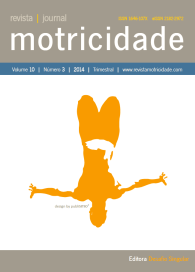The effect of self-goal setting on the acquisition of a motor skill
DOI:
https://doi.org/10.6063/motricidade.2981Abstract
The aim of the study was to investigate the self-goal setting on the motor skill learning. Sixty undergraduates with no experience in the Bachman ladder task were recruited for this research. The phases of the design were: acquisition (10 blocks × 10 trials) and transfer (10 trials). Participants were randomly assigned into two groups (n= 30): self-goal setting and yoked. From the yoked group a third group was stratified, which involved those participant that, even with a goal externally set, self-set their own goal (n= 20). In the acquisition phase a Friedman’s test was run in each experimental group to determine intragroup differences. In the transfer phase a Kruskal-Wallis test was carried out to check differences between groups. The results showed that for all groups there was increase in performance during acquisition phase. In the transfer test both self-goal setting groups were better than yoked group. It was concluded that when the learner sets his own goals, the process of motor learning became more effective.
Downloads
Published
Issue
Section
License
The authors of submitted manuscripts must transfer the full copyright to Journal Motricidade / Sílabas Didáticas Editions. Granting copyright permission allows the publication and dissemination of the article in printed or electronic formats, and copyrights start at the moment the manuscript is accepted for publication. It also allows Journal Motricidade to use and commercialise the article in terms of licensing, lending or selling its content to indexation/abstracts databases and other entities.
According to the terms of the Creative Commons licence, authors may reproduce a reasonable number of copies for personal or professional purposes, but without any economic gain. SHERPA/RoMEO allows authors to post a final digital copy (post-printing version) of the article on their websites or on their institutions' scientific repository.


